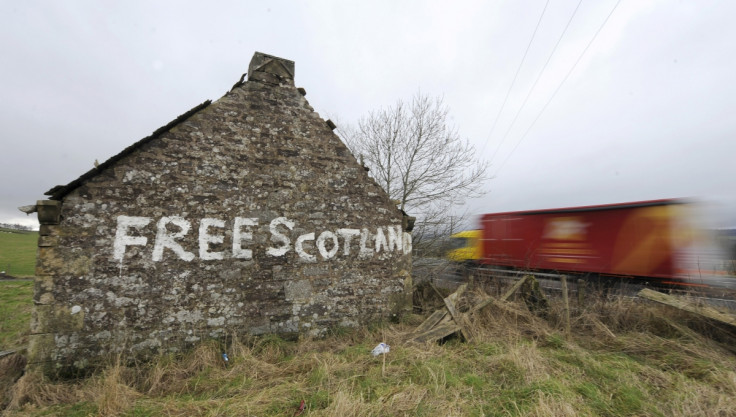Scottish Independence Will Cost 40,000 Jobs - but Boost London Employment

The Centre for Economics and Business Research predicts that Scotland will lose between 20,000 and 40,000 jobs if the country breaks its 307-year union with England as it will lead to a "mass exodus" of financial services companies.
According to extracts from a speech, the founder of the CEBR, Douglas McWilliams, will warn the markets at the Gresham Professorial Lecture in London later today that many financial firms will immediately leave Scotland in the event of independence, because of the lack of a fiscal, monetary or banking union.
"Some industries in Scotland would be boosted by independence. One suspects that the tourism industry for example will ultimately benefit. But finance is highly likely to suffer," McWilliams will say.
"The experience of the euro means that it is highly unlikely that there will be a banking union if Scotland is independent. Without that, most of the Scottish financial services economy will migrate to England where their customers are. This is potentially a huge boost to the City of London."
Scotland's financial sector currently employs around 85,000 people.
Meanwhile, Scottish National Party leader Alex Salmond has repeatedly promised voters that Scotland will keep the pound, its place in the European Union and be financially strong in the event of independence, despite a raft of analysts, economists and politicians saying otherwise.
He also claimed towns bordering an independent Scotland would see a rise in jobs and business prospects in the region.
At the end of February, a poll revealed that the majority of Britain's biggest business leaders are against Scotland exiting the UK as independence would have a negative impact on companies.
According to a survey by recruitment firm Korn Ferry, 65% of the 32 FTSE 100 companies polled said it would be "particularly bad for the Scots, not good for the English and would dilute the UK's economic influence".
This month, Brewin Dolphin, one of Scotland's largest wealth managers, revealed that the uncertainty and "confusion" over the September referendum is hindering its ability to advise clients over their savings.
The Scottish company, which has £5bn (€6bn, $8.4bn) in assets under management, told the Telegraph that it is "perplexed" by the lack of answers over key financial policies concerning savings, taxation treatment and interest rates, in the event of independence.
It added that this has brought difficulty in managing investment portfolios.
"The Scottish question is already having an impact on how portfolios are managed, as some factor in possible liquidity, currency and interest rate risks," said Stephen Ford, head of investment management at Brewin Dolphin.
"We will continue to press for clarification and to do the best for our customers throughout this period of considerable uncertainty."
Furthermore, Standard Life said it may quit its Scottish home if the nation breaks from the UK while a number of other financials have domiciled their subsidiaries in England, to prepare for possible independence.
Scottish people will vote in an independence referendum in September this year and will be asked the straight "yes/no" question: "Should Scotland be an independent country?"
© Copyright IBTimes 2025. All rights reserved.






















